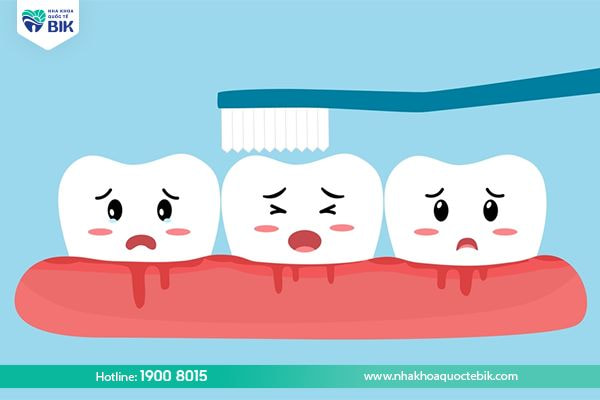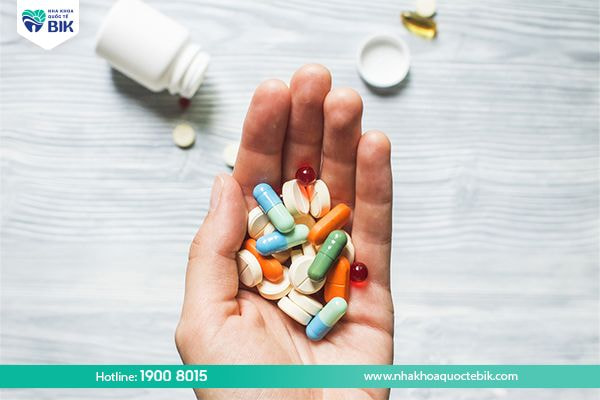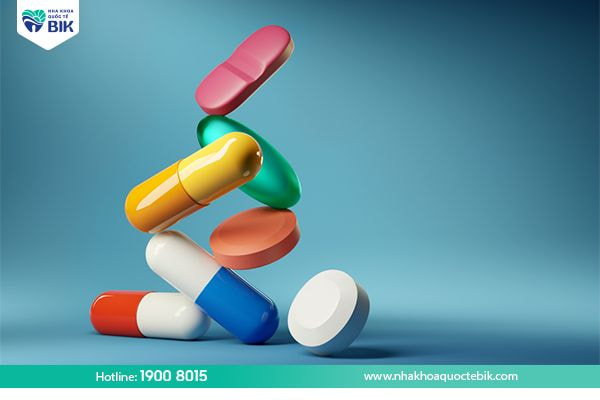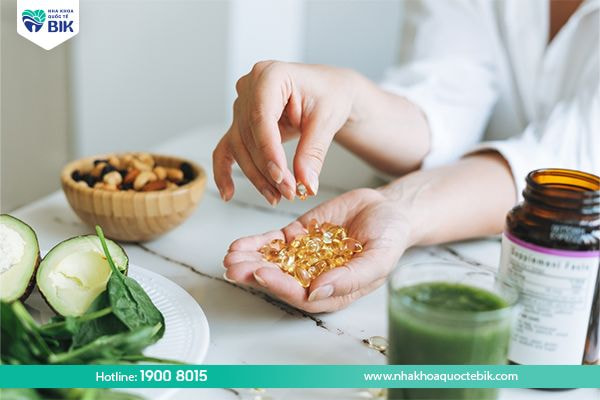Bleeding gums is not actually a disease but only a sign of other dental problems. Therefore, you need to see a doctor for a specific examination and examination to find out the cause of bleeding gums. From there, what medicine to take for bleeding gums will be prescribed by the doctor for each different case of each person to bring the best treatment results.
1. Causes of bleeding gums
Bleeding gums are basically not a type of dental disease but a manifestation of other dental problems. The main causes of bleeding gums include:
- Plaque and bacteria that have accumulated for a long time are calcified into tartar, causing damage and bleeding gums.
- Daily oral care is not performed properly, creating conditions for bacteria to attack the gums and cause inflammation.
- In cases where teeth grow crookedly or have misaligned bites, it can also cause gingivitis and lead to bleeding gums.
- The body’s lack of resistance, lack of vitamin C or blood sugar diseases can also lead to bleeding gums.

2. Does bleeding gums cause any dangerous effects?
In addition to the above reasons, bleeding gums can also be simply due to the gums or teeth being accidentally hit hard when chewing hard objects. If this condition only occurs for a moment and does not continue any more times during the day, customers do not need to worry.
However, if the gums bleed many times a day or persist for many days, you need to go to the dentist for examination to find the specific cause before being able to proceed with thorough treatment.
3. What medicine should be taken for bleeding gums?
Depending on each case, the doctor may prescribe some of the following medicines:
3.1. Anti-inflammatory drugs
Anti-inflammatory drugs are drugs often prescribed by doctors with the property of effectively reducing swelling and inflammation. The anti-inflammatory drug Alphachymotrypsin is the most popular drug today because it contains an enzyme that can enhance chemical reactions in the body.

This drug can be used in pill or lozenge form. Adults are prescribed a dose of 2 pills/time, 3-4 times a day depending on the doctor’s instructions.
3.2. Antibiotics
Antibiotics have the effect of killing bacteria as well as plaque containing bacteria, so they are often used in cases of bleeding gums due to infection.

Some common antibiotics for treating bleeding gums are as follows:
- Tetracycline: This drug has the effect of preventing the growth of bacteria, take the drug 1-2 hours before eating on an empty stomach. The dose is 500mg each time, taken twice a day. The duration of use is 5-7 days depending on the infection.
- Azithromycin antibiotic: This drug will inhibit the growth of bacteria that cause severe gingivitis. It is also used to treat patients who are addicted to tobacco.
- Metronidazole: This is an antibiotic prescribed for patients with severe periodontitis, and is most effective when combined with Spiramycin.
- Ciprofloxacin: This is an antibiotic used to treat periodontitis with sensitive Actinomycetemcomitans. The drug is used in tablet form divided into 2 doses per day, contraindicated for children under 12 years old.
- Amoxicillin antibiotic: The drug has the effect of fighting bacterial infections. Use 2 tablets of 500mg/time and 2 times per day. This is an antibiotic that is considered safe for pregnant and lactating women.
3.3. Supplementing important vitamins
Vitamins such as vitamin C, vitamin PP, vitamin E are all effective in treating bleeding gums. In particular, vitamin C is an essential nutrient to increase the body’s resistance, fight inflammation and bleeding gums. Vitamin E will inhibit inflammatory cells. Vitamin PP will speed up the regeneration of the mucosa and heal wounds quickly.
You can supplement these vitamins from green vegetables, fruits every day or use oral pills.

3.4. Oriental medicine
Oriental medicine shows that the main cause of bleeding gums is heat. Therefore, you can refer to some Oriental medicine recipes to treat bleeding gums below:
Recipe number 1:
Prepare the following ingredients: 20g kapok bark, 20g black-roasted eclipta, 20g dandelion, 12g forsythia, 12g angelica, 12g ginseng, 10g raw rehmannia, 12g rehmannia root bark, 10g tangerine peel, 12g licorice, 10g white peony. The patient boils the above ingredients with warm water and drinks the decoction.
Prescription number 2:
Prepare the ingredients according to the following quantities: 20g of Chinese smilax glabra, 16g of sea buckthorn, 16g of plantain leaves, 16g of mulberry leaves, 16g of licorice, 12g of Phellodendron bark, 12g of gardenia fruit, 12g of Tonglu, 10g of tangerine peel, 10g of Chinese clematis, 6g of Coptis chinensis. The patient boils the above ingredients with warm water and takes the decoction to drink.

4. Oral care to treat bleeding gums
- Brush your teeth at least twice a day, especially after eating, to clean plaque on your teeth.
- Use a soft-bristled toothbrush with just enough force to avoid damaging your gums and causing bleeding gums.
- Replace your toothbrush every 3-4 months to ensure that bacteria do not accumulate and attack your gums.
- Combine dental floss to ensure complete removal of food debris between teeth.
- Use fluoride toothpaste to help strengthen teeth.
- Regular check-ups at least twice a year ensure timely detection and treatment of any oral problems.
So what medicine to take for bleeding gums depends on each person’s specific condition. Customers should note that they should not use any medication without a doctor’s prescription to ensure overall health safety and avoid making gum bleeding worse.


















